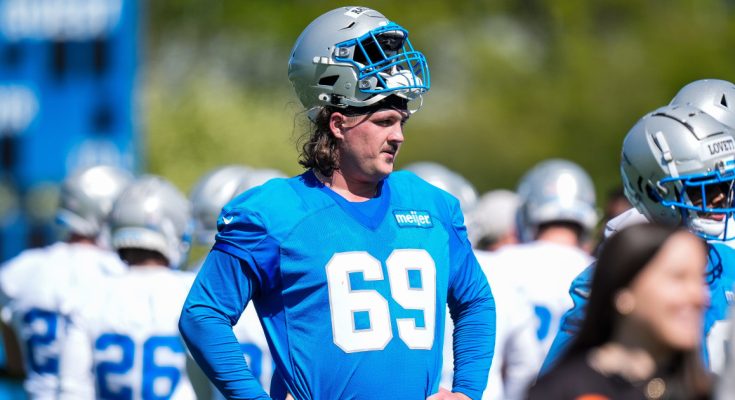The Detroit Lions have made a significant change to their practice routines following the relentless dominance of defensive end Aidan Hutchinson, whose performances in training sessions have forced the coaching staff to rethink their approach. The new rule, which limits Hutchinson’s participation in certain drills, is a testament to his rapid development and the challenges he poses to the team’s offensive line. This adjustment underscores the delicate balance coaches must strike between fostering competition and ensuring their players remain healthy and prepared for the regular season.
Hutchinson, the No. 2 overall pick in the 2022 NFL Draft, has been a force since joining the Lions. His work ethic, combined with his natural talent, has made him a standout in practices, often overwhelming offensive tackles with his speed, power, and technique. While his dominance is a positive sign for the Lions’ defense, it has also created an unusual problem: the offensive line, still gelling as a unit, has struggled to contain him, leading to concerns about morale and consistency in the trenches.
Head coach Dan Campbell, known for his intensity and hands-on approach, recognized the issue early. “Aidan is a special player, and he’s getting better every day,” Campbell said. “But we also have to make sure our offensive guys are getting the right looks and not getting discouraged. There’s a fine line between competition and frustration, and we have to manage that.” The new rule limits Hutchinson’s reps in one-on-one pass-rush drills, giving the offensive line more opportunities to work against other defenders without facing his relentless pressure every snap.
This decision highlights a broader philosophy within the Lions’ organization. While competition is encouraged, the coaching staff is mindful of the psychological and physical toll constant battles can take on players. Offensive tackles like Taylor Decker and Penei Sewell, both key pieces of the Lions’ line, have faced Hutchinson daily, and while the challenge has sharpened their skills, it has also led to moments of frustration. “Going against Aidan every play is like taking a final exam every day,” Decker joked. “It’s great for improvement, but sometimes you need a breather.”
The Lions are not the first team to implement such measures. Across the NFL, coaches have occasionally limited star players in practice to preserve their health or maintain balance. The San Francisco 49ers, for example, have managed Trent Williams’ practice reps for years to keep him fresh. However, what makes Detroit’s situation unique is that the restriction is not due to injury concerns but rather to the sheer dominance of a young player disrupting the equilibrium of practice.
Hutchinson’s rise has been meteoric. After a stellar college career at Michigan, where he was a Heisman Trophy finalist, he seamlessly transitioned to the NFL, recording 9.5 sacks in his rookie season. His sophomore campaign saw even greater growth, as he became one of the league’s most feared edge rushers. His performance in practice has mirrored his in-game success, with teammates and coaches routinely praising his motor and technical refinement. Defensive coordinator Aaron Glenn has called him “a coach’s dream” due to his relentless pursuit of improvement.
Yet, the Lions’ decision also raises questions about the offensive line’s readiness. If Hutchinson is causing this much disruption in practice, how will the unit hold up against other elite pass rushers during the season? Campbell and offensive line coach Hank Fraley have emphasized that the new rule is not an indictment of the line but rather a strategic move to ensure balanced development. “We have a lot of young guys who are still learning,” Fraley said. “It’s about giving them the right mix of challenges so they can grow without getting overwhelmed.”
The Lions’ approach reflects a modern understanding of player development. In the past, the mentality was often “sink or swim,” with coaches throwing players into the deep end to see who could handle the pressure. Today, teams are more nuanced in their methods, recognizing that confidence and repetition are just as important as competition. By managing Hutchinson’s reps, the Lions are investing in the long-term growth of both their offensive and defensive units.
For Hutchinson, the new rule is a sign of respect. While he may not get as many opportunities to wreak havoc in practice, his impact is undeniable. Teammates have noted that even on limited snaps, his presence elevates the entire defense. “When Aidan’s out there, you feel it,” linebacker Alex Anzalone said. “He sets the tone, and that energy carries over to the rest of us.”
As the Lions prepare for the upcoming season, this adjustment could prove pivotal. If the offensive line can build confidence against other defenders, they may be better equipped to handle elite pass rushers in games. Meanwhile, Hutchinson’s controlled exposure ensures he remains sharp without risking overexertion. It’s a calculated move that underscores Detroit’s commitment to building a sustainable contender.
In the end, the Lions’ new practice rule is a microcosm of their broader philosophy: compete hard, but compete smart. Aidan Hutchinson’s dominance is a luxury, not a problem, and by managing it carefully, the team is positioning itself for success. As the season approaches, all eyes will be on whether this balance pays off—both for Hutchinson and the offensive line tasked with blocking him.



